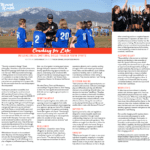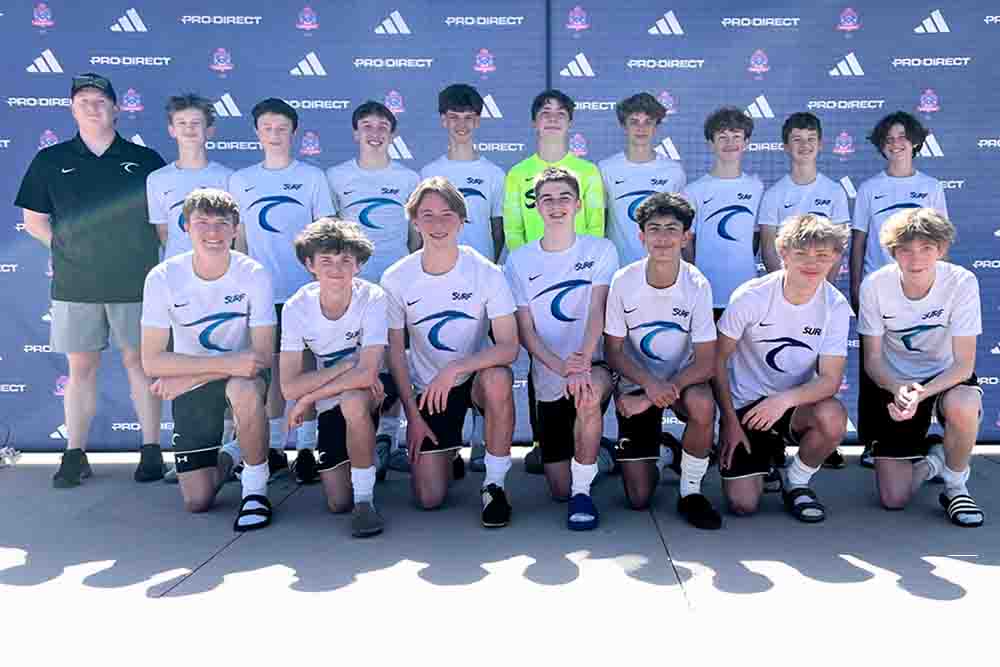por Cate2
Cuota
Cuota

Coaching for Life:
Building Social Emotional Skills Through Youth Sports
“The only constant is change.” Greek philosopher, Heraclitus, coined this phrase over 2,500 years ago and it feels more relevant now than ever. With exponential technology, a shifting natural environment, and a pandemic present in our day-to-day lives it feels as if the rules are always changing. Parents everywhere are wondering how to prepare kids for this new world where we must always expect the unexpected.
Youth sports provide an accessible, local solution for building the social emotional skill base kids will need to thrive in this new, whirlwind world. “Living through the COVID-19 pandemic has put into focus the skills that children and adolescents need to survive and thrive through big challenges and rapid changes. Words like resilience, adaptability, compassion, courage, and hope come up over and over. From my experience and knowledge as an international athlete, ski coach, and mental health therapist, I have seen that a solid social-emotional foundation sets kids up for success during difficult times,” shared Emily Danza, a mental health, sports, and performance therapist at Lotus Counseling in Bozeman. “One of the best ways to develop emotional IQ can be through participation in sports, which provides a variety of life skills and emotional building values.”
While kids are focused on the scoreboard when they step onto the playing field, the wins are also the developmental gains. “Only a small percentage of youth athletes go on to play collegiate or professional sports. Knowing that, one of our goals is to make great humans through life lessons learned on the field. We develop specific learning opportunities for our players, emphasizing social emotional skills along with excellence, because giving your best effort is also a life skill,” said Vanessa Davis, Competitive Director for Montana Surf Soccer Club.
We asked Danza, Davis, and Headwaters Lacrosse Boy’s Program Director, Todd Thesing, to share the most significant social-emotional skills kids are learning through participation in youth sports:
SPORTSMANSHIP
We live in a polarizing time when adults with opposing viewpoints struggle to find middle ground. Good sportsmanship is about respecting your opponent, giving your best effort, bringing your highest level of competition, and shaking hands after a game well played. “Developing a sense of sportsmanship and a respect for the other team helps kids to grow into empathetic adults who are able to honor opposing viewpoints and seek common solutions,” said Davis.
RESILIENCE
By definition, competition means facing off against an adversary, and as a result, experiencing adversity. Game day losses, missed plays, injuries and hardship are all part of sports. “The playing field is a safe, low-consequence environment for kids to experience adversity and to practice working through it. With each missed goal, last place finish, failure, and skinned knee, youth athletes experience hardship, learn to work through it and develop confidence in their ability to overcome. They become resilient,” said Thesing.
DECISION MAKING
“Team practices offer an opportunity to try out situations and outcomes. Drills and scrimmages play out differently each day and offer kids chances to try something, fail, and make a new decision the next time,” said Davis. “Coaches are there to evaluate a choice with the athlete, ask the athlete what they would change the next time, and guide them toward a different, more effective solution. Doing this over and over on the playing field develops confidence and enables kids to make solid choices off the turf.”
INTEGRITY
Sport is governed by rules and regulations designed to create enjoyable experiences and great competition through mutual understanding. Integrity is the moral imperative to adhere to those rules and regulations. “Our athletes are taught from the start to follow the rules, to play fair and to be honest. Doing so shows respect for an opponent and results in the most satisfying wins,” said Davis.
EMPATHY
“Whether you’re a part of a team or you are an individual competitor, empathy is a true pillar of being an athlete. It can fuel your need and desire to excel, or let you take a step back and help others in need. Because we feel so deeply, when something positive or negative happens to a teammate or opponent, we learn how to empathize because we know ‘exactly’ how the other person is feeling. We develop this natural ability to hone in on others’ emotions and use them to help (good sportsmanship) and also, most importantly, create the best version of ourselves,” said Danza.
RESPONSIBILITY
“Responsibility is the moment an individual steps up and decides to take ownership of their life. Sports fulfill many areas of self-responsibility, but also teach how to give others an equal amount of responsibility, leading to positive leadership. By owning our performance, and wanting to become the best versions of ourselves, sports help us measure whether we are taking enough responsibility for our physical, emotional, and cognitive selves. It is usually one of those skills that has pretty immediate feedback, and will show up on and off the field.” – Emily Danza
WORK ETHIC
It takes time and commitment to develop athletic skill. Athletes repeat drills, fine tune plays and build physical fitness over weeks, months and years. While they are building skills, they are also developing work ethic. “Studies have shown that athletes perform better in the classroom than other students. Athletes have seen that hard work over time builds mastery and they approach classwork with patience and dedication,” said Thesing.
Our quickly changing world requires citizens who are emotionally prepared to tackle unprecedented challenges. Participation in youth sports offers kids the opportunity to hone their social emotional skills along with their athletic capability, developing qualities like resilience, empathy, sportsmanship and a strong work ethic that will ensure they flourish in our fast-changing world.
PERMANECER EN EL BUCLE









